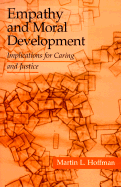Book contents
- Frontmatter
- Contents
- Acknowledgments
- 1 Introduction and Overview
- Part I Innocent Bystander
- Part II Transgression
- Part III Virtual Transgression
- Part IV Is Empathy Enough?
- Part V Empathy and Moral Principles
- 9 Interaction and Bonding of Empathy and Moral Principles
- 10 Development of Empathy-Based Justice Principles
- 11 Multiple-Claimant and Caring-Versus-Justice Dilemmas
- Part VI Culture
- Part VII Intervention
- References
- Author Index
- Subject Index
11 - Multiple-Claimant and Caring-Versus-Justice Dilemmas
Published online by Cambridge University Press: 05 June 2012
- Frontmatter
- Contents
- Acknowledgments
- 1 Introduction and Overview
- Part I Innocent Bystander
- Part II Transgression
- Part III Virtual Transgression
- Part IV Is Empathy Enough?
- Part V Empathy and Moral Principles
- 9 Interaction and Bonding of Empathy and Moral Principles
- 10 Development of Empathy-Based Justice Principles
- 11 Multiple-Claimant and Caring-Versus-Justice Dilemmas
- Part VI Culture
- Part VII Intervention
- References
- Author Index
- Subject Index
Summary
In complex moral encounters, bystanders must choose which victim to help. I deal first with moral dilemmas within the caring domain and then dilemmas involving conflict between caring and justice. A third type, conflict between caring and duty or responsibility, is often a sub-variant of one of these.
MULTIPLE CLAIMANT DILEMMAS
Multiple claimant dilemmas in the caring domain that come to mind are people drowning or caught in a burning building; the bystander cannot help them all and must make a choice. There are other highly visible and controversial dilemmas: A doctor deciding whether to perform an abortion on a pregnant teenager – the moral claimants are the teenager, her parents who are concerned about her future, and, depending on its age, the fetus; a lawyer deciding whether to defend an accused murderer he or she believes is guilty – the moral claimants are the defendant who the law says has a right to a legal defense, the victim's family, and potential victims if the defendant goes free.
Another example is Kohlberg's hypothetical World War II air-raid warden who had to choose between remaining at his post or leaving to help his family when he heard his family's part of town was on fire. And the similar but very real dilemma faced by a nurse who was helping a victim of the Oklahoma City bombing when she heard the second bomb blast. She left the victim and rushed home to help her own family. She later said “I felt it was my family or her.”
- Type
- Chapter
- Information
- Empathy and Moral DevelopmentImplications for Caring and Justice, pp. 263 - 270Publisher: Cambridge University PressPrint publication year: 2000



